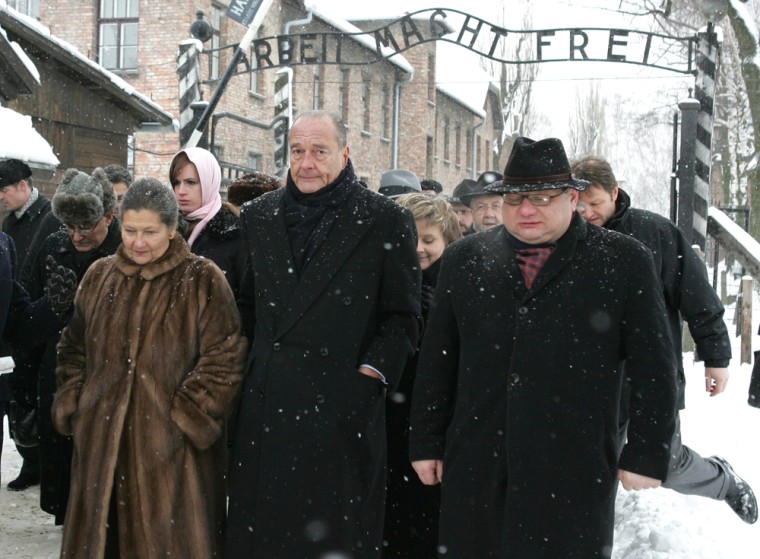As candles flickered in the snowy, winter gloom, world leaders and Auschwitz survivors Thursday remembered victims of the Holocaust on the 60th anniversary of the liberation of the Nazi death camp.
The ceremony, which opened with the sound of an approaching train, was held on the spot where new arrivals at the vast camp were subject to “selection” — meaning a few were deemed able to work, while most were taken immediately to gas chambers.
“For a former inmate of Auschwitz, it is an unimaginable and overwhelming emotion to be able to speak in this cemetery without graves, the largest one in the history of Europe,” said Wladyslaw Bartoszewski, a survivor who later became Poland’s foreign minister.
When he arrived in 1940, he recalled, “I never imagined I would outlive Hitler or survive World War II.”
Girl Scouts brought blankets to elderly survivors sitting in the freezing cold and heavy snowfall.
Presidents Aleksander Kwasniewski of Poland, Vladimir Putin of Russia, and Moshe Katsav of Israel also attended the ceremony. German President Horst Koehler was present, but plans called for him to remain silent in token acknowledgment of his country’s role as perpetrator of the Holocaust, in which 6 million Jews died during World War II.
Cheney speaks at earlier forum
Maj. Anatoly Shapiro, 92, who commanded the unit that captured the camp on Jan. 27, 1945, earlier greeted leaders and survivors at a Holocaust forum in Krakow ahead of the main ceremony at the Auschwitz and Birkenau camps.
“I would like to say to all the people on the earth: Unite, and do not permit this evil that was committed,” Shapiro said in a recorded video greeting played in Krakow’s Slovacki theater. “This should never be repeated, ever.”
Vice President Dick Cheney noted that the Holocaust did not happen in some far-off place but “in the heart of the civilized world.” He said “the story of the camps shows that evil is real and must be called by its name and must be confronted.”
The forum began with applause for Shapiro, who lives in the United States and was too ill to travel, and three other Soviet army veterans who helped liberate Auschwitz.
Putin won long applause when he acknowledged that anti-Semitism and xenophobia had surfaced in Russia, tackling an issue that the Kremlin had long failed to confront directly. Putin said many in the world should be ashamed of new manifestations of anti-Semitism six decades after the defeat of fascism.
“Even in our country, in Russia, which did more than any to combat fascism ... we sometimes unfortunately see manifestations of this problem and I, too, am ashamed of that,” Putin said.
7,000 Auschwitz survivors
Some 1.5 million people, most of them Jews from across Europe, died in gas chambers or of disease, starvation, abuse and exhaustion at Auschwitz and Birkenau — the most notorious of the death camps set up by Adolf Hitler to carry out his “final solution,” the murder of Europe’s Jewish population.
Soviet troops reached Auschwitz in January 1945, finding some 7,000 survivors, many barely alive. The retreating Nazis had driven most of the prisoners who still had strength to walk out into the snow on a “death march” toward camps further west.
Six million Jews died in the Nazi camps, along with several million others, including Soviet prisoners of war, Gypsies, homosexuals and political opponents of the Nazis.
Survivors who returned for the commemoration stressed that each new generation needs to be educated about the Holocaust.
“It’s very important, you are the last generation that can talk to the survivors. We are every day less,” Trudy Spira, who was deported to Auschwitz in 1944 with her family as an 11-year-old from Slovakia, told reporters in Krakow.
“We can give living testimony ... to let the world know, to try to get them to learn even though they don’t, so that it doesn’t happen again.”
Rising anti-Semitism in Europe
Reports in western Europe of increasing anti-Jewish incidents such as vandalizing graves and a walkout last week by members of a small German far-right party from an Auschwitz commemoration in the Saxony state legislature were cited as examples of why it’s important to go on teaching about the Holocaust.
In Russia, a group of nationalist lawmakers called for an investigation aimed at outlawing all Jewish organizations and punishing officials who support them, accusing Jews of fomenting ethnic hatred and saying they provoke anti-Semitism.
The Foreign Ministry and the prosecutor general condemned the letter.
“Today there are 70,000 skinheads in Russia, I’d like him to talk about that, and law enforcement organs don’t allow proper investigations into cases of incitement of racial hatred, and today people with a different skin color or nationality are killed,” said Alla Gerber, head of Russia’s Holocaust Foundation.
